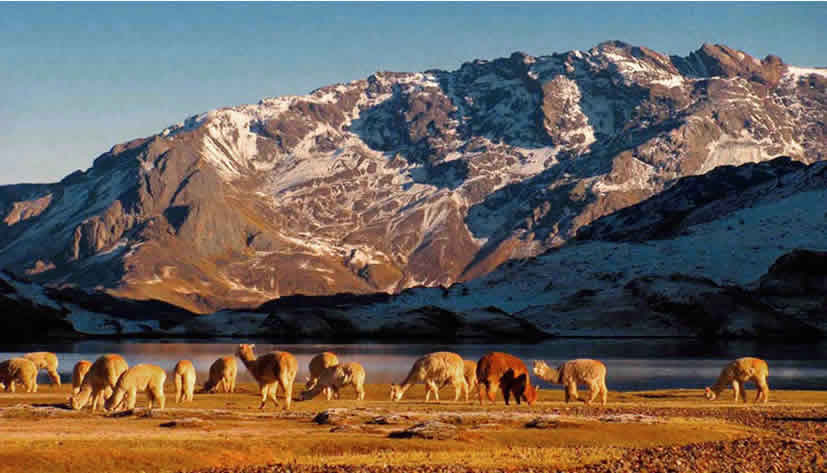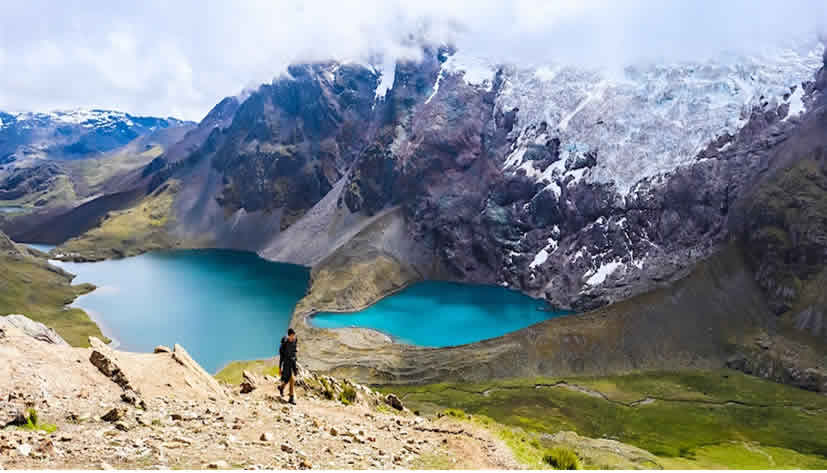An amazing and less-known trek surrounding the snow-capped Sacred Mountain (“Apu”) of Ausangate (6.372m/20900ft) that takes you over mountain passes, awesome mountain scenery, remote Andean villages, hot springs and turquoise lakes. This is an unforgettable hike recommended for lovers of mountain trek-king searching for an intense experience in remote areas and wild nature.
Daily Summary:
Day 1: Cusco to Upis
Day 2: Upis to Aunsangatecocha
Day 3: Ausangateqocha to Q´ampa
Day 4: Q´ampa t Pacchanta
Day 5: Pacchanta to Tinki
Cusco to Upis
Very early we leave the city of Cusco in a private transport, and drive along the Cusco – Puerto Maldonado highway in the direction of Tinki (3800m/12464ft). On the way we pass through Urcos, where we may spot a beautiful lagoon with the same name, continue on to Cattca, an agricultural and cattle raising community where we can appreciate the region’s spectacular views and finally cross Ocongate, capital of the district with the same name and only half an hour away from our destination. After an approximated 4-hour drive, we arrive in Tinki, where we meet our wranglers and horses. We start our trek initiating a slight climb that crosses through puna (dry, high area with little vegetation) to then arrive at our lunch spot after a three-hour walk. From here we already have beautiful views of the sacred Ausangate peak (6372m/20900ft). After lunch, we continue walking for another hour and a half to reach our campsite in Upis at 4400m/14432ft. From this point, we may appreciate fabulous views of all the snow peaks in the area. We camp and dine directly in front of Ausangate.
Meals: L, D.
Upis to Ausangatecocha
After breakfast, we continue our hike ascending for two hours to reach La Arapa pass (4850m/15908ft). We then descend to our lunch spot, crossing an area of falcons and ¨vizcachas¨ or Andean rodents. This area also boasts three beautiful lakes with tones of reds, greens, and turquoises (Pukacocha, HatunPukacocha, and Qomerqocha) and spectacular views of the surrounding snow peaks. After lunch, we continue on a long and slow ascent.
that will take us, after about two hours, to the second mountain pass, the Abra de Apuchata (4900m/16072ft), from which we descend, for another half an hour, towards our campsite at Ausangatecocha (4440m/14563ft).
Meals: B,L,D.
Ausangateqocha to Q´ampa
Today, we depart early to climb for two hours towards the third mountain pass, the Abra de Palomani (5200m/17056ft). This is the highest part of the entire hike, from which we then descend for another 2h through an area of llamas, alpacas and ¨vizcachas¨ to reach Pampacancha (4050m/13284ft). From here we follow an uphill trail until that leads us to our campsite in Q´ampa (4300m/14104ft). Along this easy 3-hour climb we may have the chance to spot llamas, alpacas, and maybe even pumas. Dinner and overnight at camp.
Meals: B, L, D.
Q´ampa to Pacchanta
We climb for 2 hours until we reach Q´ampa mountain pass (5000m/16400ft), where we may have the chance to spot the Andean deer. From here we descend towards the Qomerqocha lagoon to finally arrive at Pacchanta (4100m/13448ft) after an approximated five-hour walk. Pacchanta is a little community with attractive hot springs where we can enjoy a relaxing dip. We camp and spend the night at this place.
Meals: B, L, D.
Pacchanta to Tinki
We leave Pacchanta and start to walk our way back to Tinki, which will take approximately 2 hours. Once in Tinki, we board a private transport that will take us back to the city of Cusco, where we estimate to arrive after nightfall.
Meals: B, L.
WHat is included?
- Pre-departure briefing
- Collection from your hotel in the morning and transfer in private transportation to Upis (starting point of the trek)
- Personal tents: 2 people in each 4-people-capacity tent, to allow for higher comfort and a safe keeping of backpacks. Our tents are 3-season, highly maintained to ensure an excellent performance in field. Eureka Timberline 4 Outfitter tents are employed when double accommodation is requested and Eureka Timberline 2XT for single travelers
- One inflatable sleeping pad per person
- One pillow per person
- Dining tent with tables and chairs
- Kitchen tent
- Local Tour guide
- Chef and cooking equipment
- Pack animals (to carry tents, food and cooking equipment) — days 1 to 4
- Pack animals to carry personal gear up to a maximum of 9 kg per person (including sleeping pad and sleeping bag) — days 1 to 4
- 1 emergency horse every 6 persons — days 1 to 4
- Wranglers – days 1 to 4
- Accommodation for all our staff
- Meals (03B, L 04, 04D + daily morning snack + daily tea service except last day). Vegetarian or special menus are available at no extra cost
- Filtered boiled water from lunch time on 1st day onwards
- Bio-degradable personal hand soaps
- Bio-degradable dishwashing detergents used by our kitchen staff
- Others: hot water every morning and evening for washing purposes / boiled water to fill in your water bottle every morning and night, and at lunch time if requested with enough time ahead
- First-aid kit including emergency oxygen bottle
- Transfer train station-hotel in Cusco
- 24-h guest service: please ask for the emergency number available during your time of visit
What is not included?
- Domestic or international flight tickets, please let us know if you wish us to assist you with this booking
- Breakfast on the first day
- Tips: please note that our agency staff is well paid so please feel free to tip or not as you wish
What we recommend that you bring
- A backpack with a change of clothes for the whole period of the trek
- Rain gear (jacket and pants if available) or rain poncho (plastic ponchos can be purchased in Cusco)
- Strong footwear, waterproof trekking boots recommended
- Sandals or jogging shoes for a higher comfort while at camp
- Warm clothes, including jacket, fleeces. Thermal clothing is also recommended, especially for sleeping
- Flashlight/headlamp and batteries
- Camera and batteries (batteries consume more quickly under cold conditions)
- Hat or cap to protect you from the sun, rain and cold
- Sun block
- After-sun cream or hydrating cream for face and body
- Insect repellent — minimum recommended 20% DEET – no malaria risk has been reported
- Handkerchiefs
- Toilet paper
- Snacks: biscuits, energy bars, chocolate, raw fruits, muesli, etc. Please note that we do provide a daily morning snack and our meal service is very complete and well supplied. This recommendation applies for all clients being used to a specific snack, as it may happen that it is not included in our selection
- Water container and water for the first morning. Important notice: plastic water bottles are no longer allowed into Machu Picchu. Plastic water containers (ie. Nalgene) or metal ones are recommended
- Optionally: water-sterilizing tablets in case you pick up water from streams or rivers along the route. Otherwise, we provide filtered boiled water, which is safe to drink and has not reported any health problem so far
- Small towel
- Swimsuit (if you wish to go to the hot springs in Aguas Calientes)
- Cash in soles and/or US$
- Original passport
- Original International Student Identity Card (in case you have applied for a student discount)
- Optional: walking sticks or poles (rubber covers required in order not to damage archaeological sites)




Tour Reviews
There are no reviews yet.
Leave a Review